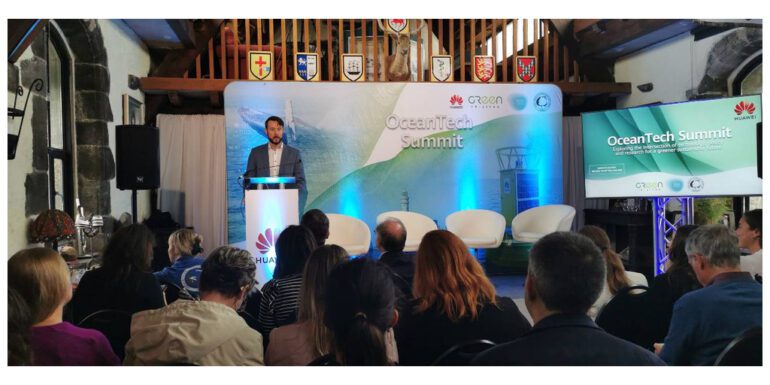TL;DR:
- Huawei and ORCA reveal findings on marine life protection in Ireland at the OceanTech Summit.
- Shipping lanes in the Celtic Sea are causing significant noise pollution, impacting various marine species and endangering whales.
- A real-time multi-species detection system developed by Huawei and ORCA offers practical solutions for marine conservation.
- This technology provides real-time notifications to ships about the presence of whales, aiding in the planning of marine infrastructure projects.
- Leaders in the industry, including GeSI and Huawei, commend this innovative approach to marine conservation.
Main AI News:
In a groundbreaking partnership that exemplifies the fusion of technology and environmental conservation, Ocean Research and Conservation Association (ORCA) of Ireland and Huawei Ireland have unveiled their latest discoveries in marine life protection. This collaborative effort, realized through the Smart Whales Sound project, was officially revealed during the prestigious OceanTech Summit, held at Ireland’s iconic Baltimore Castle.
The study’s most significant revelation lies in the profound impact of shipping lanes in the Celtic Sea, situated to the south of Ireland. Research conducted jointly by ORCA and Huawei has shed light on how these maritime routes contribute substantially to noise pollution in the marine environment. Previous studies have already underlined the detrimental effects of ocean noise on a plethora of marine species, ranging from seals and fish to even the elusive squid, while posing a grave threat to the survival of majestic creatures like whales.
A cutting-edge, real-time multi-species detection system has demonstrated its practical utility in the realm of marine conservation. This innovative system boasts a novel acoustics data acquisition system that can provide ships with real-time notifications about the presence of whales in their vicinity. The implications of this development extend beyond safeguarding marine life; it can potentially revolutionize the planning and execution of critical marine infrastructure projects, such as offshore renewable energy facilities. By minimizing noise pollution during the construction phase, these initiatives can coexist harmoniously with the delicate marine ecosystems.
Emer Keaveney, Co-founder and Executive Director of ORCA Ireland, emphasized the critical role technology plays in mitigating the impact of human activities on marine life. Keaveney stated, “Recent advances in technology provide increasing opportunity to use these innovations for good and to enhance our understanding of the natural world. To achieve this, we are using Huawei’s [AI development platform] ModelArts and cloud storage, coupled with machine learning, to automate wildlife monitoring for marine conservation.”
Luis Neves, CEO of the Global Enabling Sustainability Initiative (GeSI), applauded this pioneering endeavor. He remarked, “The work of capturing sound in the oceans and harnessing the power of AI and big data analytics to enhance our understanding of marine ecology and its complex interactions with various threats is of paramount importance. This endeavor not only facilitates broader public engagement but also strengthens the effectiveness of conservation initiatives, ultimately contributing to the survival and well-being of marine species.” Neves also commended Huawei for its leadership in deploying cutting-edge AI and deep learning models to automatically detect and identify cetacean species, thereby supporting the preservation of dolphins and whales.
Luke McDonnell, Head of PR at Huawei Ireland, highlighted the company’s commitment to digital inclusion and sustainable development. McDonnell stated, “Huawei believes that no one should be left behind in the digital world, and we have made it our mission to put digital inclusion front and center of our business. In addition to environmental protection, we believe that digital technologies also play a key role in many other areas.” He emphasized how technologies such as AI, cloud computing, and 5G are rapidly transforming various industries, fostering digital transformation and sustainable socio-economic development that benefits society as a whole.
Initiated in March 2021, the ORCA Ireland Smart Whale Sounds project, conducted in partnership with Rainforest Connection (RFCx) and supported by Huawei Ireland through the TECH4ALL initiative, represents the first real-time marine bioacoustics study in Ireland. Preliminary analysis suggests that the south coast of Ireland is a cetacean ‘hot-spot,’ housing a rich diversity of whales, dolphins, and porpoises. In fact, cetaceans account for nearly half of all the animals residing within Ireland’s sea and land borders, underscoring their significance in the country’s marine ecosystem.
Conclusion:
The collaboration between Huawei and ORCA to protect Ireland’s marine life not only addresses critical environmental concerns but also demonstrates the potential for technology to play a vital role in advancing conservation efforts. As businesses increasingly prioritize sustainability and responsible practices, the market for eco-friendly technologies and conservation partnerships is poised for growth. Companies that invest in such initiatives can expect to gain recognition and contribute to the preservation of our planet’s natural resources.

